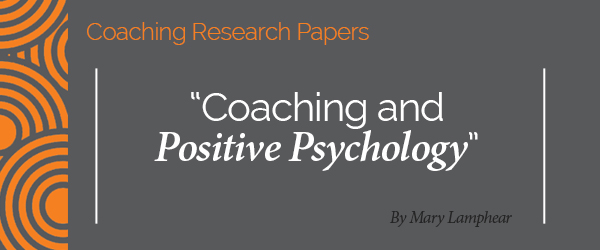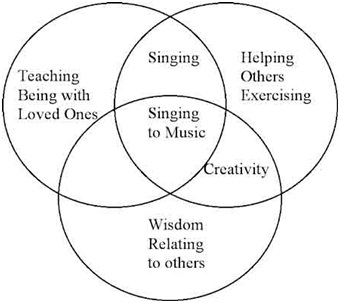
Research Paper By Mary Lamphear
(Executive Coach, UNITED STATES)
Introduction
Positive Psychology can provide the scientific grounding to coaching, while coaching can be considered the applied arm of Positive Psychology.
Positive psychology began as a new area of psychology in 1998 when Martin Seligman chose it as the theme for his term as president of the American Psychological Association.
According to Wikipedia:
Positive psychology is a branch of psychology that has as its purpose to use scientific understanding and effective interventions to aid a satisfactory life, rather than merely treating mental illness.
In contrast with traditional psychology that focuses on pathology (i.e. Anxiety, depression), the goal of positive psychology is about utilizing positive qualities shown by scientific research to enhance people’s lives and happiness in the long-term.
There are two ways for improving our well being: one is to rid ourselves of the negative things in our lives, the second is to strengthen those things that are positive. Positive psychology emphasizes the second.
Coaching is about focusing on the positive things and the future rather than the past and the negatives. Coaches who use the principles of positive psychology focus on the potential use of strengths in clients for enhancing day-to-day personal happiness.
There’s a scientific way to study happiness –– it is called Positive Psychology. Happiness grows when we have meaning in our lives.
According to Seligman, we can experience three kinds of happiness:
- pleasure and gratification,
- embodiment of strengths and virtues and
- meaning and purpose.
Each kind of happiness is linked to positive emotion but from his quote; Positive Psychology takes you through the countryside of pleasure and gratification, up into the high country of strength and virtue, and finally to the peaks of lasting fulfillment: meaning and purpose. You can see that in his mind there is a progression from the first type of happiness of pleasure/gratification to strengths/virtues and finally meaning/purpose. Attaining lasting happiness requires that we enjoy the journey on our way toward a destination we deem valuable. Happiness, therefore, is not about making it to the peak of the mountain, nor is it about climbing aimlessly around the mountain: happiness is the experience of climbing toward the peak. Tal Ben-Shahar
What are the benefits of positive psychology coaching?
Mentor Coach LLC states: Research has demonstrated that a number of positive psychology practices can effectively raise our level of happiness. The benefits of happiness are significant and widespread and extend far beyond just feeling good.
Happier people tend to enjoy better health, live a longer life, have closer friendships, are more creative and productive at work and in life, and achieve greater success. Research studies show that the happiest people tend to:
How does positive psychology help coaches to help their clients?
Mentor Coach continues: Positive psychology is a natural fit with coaching. Clients seek out coaching for a full range of issues, but underneath all of these issues is a generally unstated desire to increase their overall sense of happiness and well-being. Positive psychology provides important empirical underpinnings to the techniques and strategies that coaches use to help clients realize their goals on the path to greater well-being.
Abstract
In this research paper I will explore three areas of positive psychology – Purpose – Gratitude – Strengths. I will demonstrate how coaching can be applied to bring your client into better awareness resulting in experiencing the journey of happiness.
The purpose of our lives is to be happy. ~ Dalai Lama
What is my purpose?
No doubt have you have not only asked yourself this question at one time, but have asked it at multiple times! It is a normal question that one asks themselves at various times of their life and for various reasons. Perhaps one questions their purpose when the experience the “empty nest”, or a career change, or retirement. Whatever the reason, when we can connect with a sense of purpose it adds significant value to life. Uncovering your values and what is most important to you will help you find a sense of purpose.
Harvard professor, Dr. Tal Ben-Shahar, in his book “Happier” (Ben-Shahar, 2007, pg 103-105) explains the Meaning, Pleasure, Strengths (MPS) Process based on the work of the famous positive psychologist Dr. Mihaly Csikszentmihalyi. Csikszentmihalyi says that people are happiest when they are in a state of “flow,” or complete absorption with the activity at hand. Csikszentmihalyi describes flow as:
Being completely involved in an activity for its own sake. The ego falls away. Time flies. Every action, movement, and thought follows inevitably from the previous one, like playing jazz. Your whole being is involved, and you’re using your skills to the utmost.
To begin the MPS process, begin by asking yourself these three crucial questions:
What gives me meaning?
What gives me pleasure?
What are my strengths?
- What gives me meaning? The first place to start in discovering what gives you meaning and purpose is to define your values. These are the guiding principles that shape your behavior and judgments. What things are important to you? What do you care about? What makes you feel like you are contributing?
- What gives me pleasure? What do you enjoy? These don’t have to be work-related; you can also list hobbies, interests, and anything that brings you joy or contentment.
- What are my strengths? This discovery is discussed in the next section of this research paper.
We may also need to spend some time considering the answers to the three questions. The lists we generate may be long, and the way in which we phrase our answers may not make the areas of overlap immediately apparent.
The next step in the MPS Process is to find overlapping across the categories. The overlaps might not be obvious at first, so give it time to process. It may be that you only see an overlap in two of the categories.
 Dr. Ben-Shahar goes on to say,
Dr. Ben-Shahar goes on to say,
The MPS process can also help us make important decisions in other areas of our lives. When choosing a class in school, for example, we can look for an overlap between courses that would be meaningful for our future career, that we would enjoy, and that we would be good at.
When speaking of a meaningful life, we often talk of having a sense of purpose, but what we sometimes fail to recognize is that finding this sense of purpose entails more than simply setting goals. Having goals or even reaching them does not guarantee that we are leading a purposeful existence. To experience a sense of purpose, the goals we set for ourselves need to be intrinsically meaningful. (Ben-Shahar, 2007, pg 38)
The goal is what the Client wants to reach. In a coaching relationship you may work at a goal over many sessions. Asking the client What is priority for you right now?
is meeting them where they are and helping them to get where they want to go. Another powerful question a Coach can ask is simply What do you want?
This question will help move your Client toward clarity.
It’s best to set goals positively (e.g., number of passes made or shots-on-goal) rather than negatively (e.g., number of mistakes reduced). Positive goal-setting helps the Client focus on success instead of failure. To turn a negative goal into a positive one by asking the question: What needs to be done instead?
Craft clear-cut goals that add meaning to your life. When we say our goal out loud ask yourself if it is clear what you are trying to do. Once it is clear, ask if this is a goal you want to achieve.
To increase awareness we need to ask what our Core Values, which are true representation of our authentic selves, are. The following is an exercise to help discover your Core Values.
